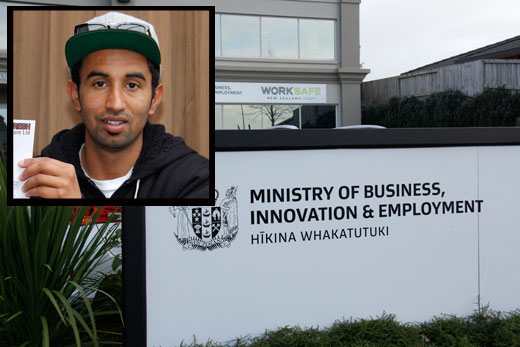Former kiwifruit worker Hardeep Singh, who lost his job after helping with an Immigration NZ investigation into the kiwifruit industry, is struggling to remain in the country.
The 28-year-old was recently fired from his job on an orchard after he says his employer found out he provided information that led to the expulsion of three illegal workers.
Kiwifruit worker Hardeep Singh is filing an urgent application for a visa.
He was given a week to leave the country by Immigration NZ.
Through an immigration consultant, Hardeep is putting in an urgent application for a visa, says Tauranga employment consultant Rachel Rolston.
'I've got a response from the immigration lady who said: ‘I've never heard of him, wouldn't have a clue',” says Rachel.
'Then Hardeep sent me a copy of the email conversation that they've had.”
Rachel says the investigation was launched by Immigration NZ and Hardeep was asked for information, and was able to provide it. He sought a reassurance that he wouldn't be deported if fired and says he was given it.
'And then his boss sent off the fax of the letter to her [immigration employee]. He knew who he was sending it to, saying Hardeep's employment's been terminated - and she comes in and has a conversation with him about him having to leave the country.
'She would have known exactly who he was and that he was an informant.”
It was the same situation with another migrant the ERNZ consultant is working with, says Rachel.
The man provided MBIE inspectors with evidence his employer was forcing him to work on a kiwifruit orchard instead of the restaurant named in his visa. He produced the employer's written demand that he pay his own taxes to the employer's account, and says the employer didn't pay him wages.
The failures are creating an environment where some sort of 'mafia situation” can arise, says Rachel.
'It's really appalling how far this has gone. The government's sitting there not quite sure what to do about all this, but they actually created the environment.
'They thought it was really great for kiwifruit, keeps the costs down for the growers, great for export operations, this is great to have all this migrant labour come it. Now we've got a problem.”
Rachel's concerns are borne out by a 2012 study into the kiwifruit industry employment practices and the conflict the government policy over migrant employment is creating between the two income streams – export education and horticultural exports.
The study cites 2011 figures showing export education was then worth $2.5 billion annually to the NZ economy. In 2010 there were 45,638 students in the post-secondary sector with the top three source countries being China, South Korea, and India.
The education and horticulture sectors are New Zealand's two major export industries and together have an export value of over $5.7 billion, a combined export value outranking all other sectors but diary and meat exports.
The study - Managed Migration - finds there is a large population of migrant students prepared to take on kiwifruit work in spite of illegal pay rates, poor conditions and long hours.
In 2011 there were more than 12,000 mainly Indian male students in New Zealand, three times the 2005-06 figures. Aged between 18 and 26, more than half stay in the Bay of Plenty, but 43 per cent make the six hour round trip from Auckland for seasonal work in kiwifruit orchards.
Many have little, or no financial support, from their family and arrive with little money to financially survive in New Zealand.
Most find the jobs through word of mouth, friends and classmates. All student migrants involved with the study are underpaid getting between $8 - $11 an hour with the average wage being $9.50. Females working in the pack house earn the highest rates, but still below the minimum wage of $14.25 an hour.
While kiwifruit pay is low it's higher than poorly paid jobs in shops and restaurants, the study finds.
Immigration status is spread between those on a current student visa and job search visa. Those on a student visa can legally work up to 20 hours, but students in the study choose kiwifruit work at low pay because they can make up the money through working long hours, the study finds.
A culture of long hours was prevalent, and necessary for many students because their wages were not sufficient, says the study. The choice of working long hours was often a ‘claytons' choice'.
All survey respondents reported working more than 20 hours as the norm; as did interviewees. Average hours worked per week were 29 hours - less than half had any formal written contract.
If anyone complains their hours get reduced and pay can be sporadic, says the report.



0 comments
Leave a Comment
You must be logged in to make a comment.